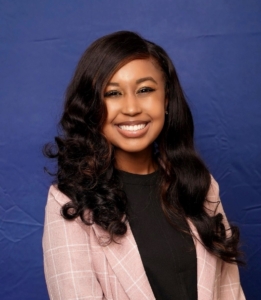 My name is Brenita Softley, and I am deeply honored to join Alabama Appleseed as a part-time extern. I am in awe of this organization’s mission to achieve justice and equity for all Alabamians— which are reasons that I decided to attend law school.
My name is Brenita Softley, and I am deeply honored to join Alabama Appleseed as a part-time extern. I am in awe of this organization’s mission to achieve justice and equity for all Alabamians— which are reasons that I decided to attend law school.
My interest in the legal realm sparked with the death of Trayvon Martin. I knew that our system was unfair, but this realization hit differently when I noticed the criminal legal system telling someone that looked like me and was the same age as me that their life did not matter. I noticed that even when Black people were killed, they were always treated as the aggressor. Realizing this, I wanted to advocate for the most marginalized in society. Throughout my law school journey, I realized that criminal defense was the best way for me to do this.
The summer following my first year of law school was historical for two reasons: our nation was fighting two pandemics at the same time—COVID 19 and racial injustice. Don’t get me wrong, racial injustice has always been a problem in our country…especially since the original sin of our country was slavery. However, the deaths of George Floyd and Breonna Taylor sparked a more modern nationwide movement. Inspired by their deaths, my classmate and I started a podcast entitled “Welcome to My America” where we discussed racial injustice and how to combat it. That summer, I expounded on this mission when I interned at the Tuscaloosa County Public Defenders’ Office. In my work there, I realized how our criminal legal system oppresses the poor. A lot of our clients were homeless or barely had enough income to sustain themselves. Yet, they were required to pay hundreds of dollars in court costs and fines. I also realized that many of our clients often resorted to crime out of necessity due to being impoverished. However, the law did not care. I made a vow to make sure that would change.
During my second year of law school, I interned with the Children’s Rights Clinic where I saw the school to prison pipeline play out. As an intern in the clinic, my job was to draft individualized education plans, ensure that my clients received appropriate educational services, and highlight mitigating arguments to the court. It was in my internship with The Southern Center for Human Rights that I realized just how important mitigation is. During my internship, I was assigned to two capital cases. Many of our clients had committed their crimes for reasons such as PTSD, poverty, or the inability to understand right from wrong. What was most heartbreaking was that one of our clients was innocent. When I visited him in prison, I was amazed at how much we had in common. I didn’t expect us to have family from the same small town of Florence, Alabama. I didn’t expect him to have a daughter that was in the same sorority as me or who went to the same school that I did. I didn’t expect him to have the same smile and glow as my dad as he was telling me about his daughter’s accomplishments. I also didn’t expect him to tell me that his source of hope was waking up each day and seeing 14 bars since this reminds him that he woke up to see another day. This client was sent to death row because of systemic injustice and racial bias that permeates the criminal legal system in Alabama. These are issues that Alabama Appleseed confronts in its work.
Each of these experiences gave me insight into the issues that plague our criminal legal system. During my final year of law school, I was able to use these various experiences in acting as a student attorney in the University of Alabama School of Law’s Criminal Defense Clinic. In the clinic, my classmates and I represented Tuscaloosa residents accused of crimes under the supervision of our professor. I was able to participate in various plea negotiations, draft motions, and make oral arguments to the court. Fighting zealously for my clients solidified my interest in criminal justice reform since I realized just how imbalanced our criminal legal system is—in the words of Paul Butler, it is designed for poor people and minorities to lose.
As a lifelong resident of Alabama, I want our state to improve and have a just criminal legal system. A criminal legal system that does not perpetuate racial disparities in arrests or sentencing. One that does not hinder the rights of the accused. One that does not cause minorities to question whether police are there to kill them or protect and serve. And one that does not punish people for simply being poor. This is something that Alabama Appleseed fights for each day by examining laws and policies through a lens of poverty and racial injustice. I am honored to use my experiences to help them in this fight.






Leave a Reply
Want to join the discussion?Feel free to contribute!